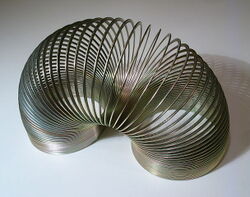Spring (device) (nonfiction): Difference between revisions
No edit summary |
|||
| (3 intermediate revisions by the same user not shown) | |||
| Line 1: | Line 1: | ||
[[File:Slinky.jpg | [[File:Slinky.jpg|250px|thumb|Slinky, a well-known variety of spring. Slinky stores mechanical energy, and later releases it in the form of fun.]]A '''spring''' is an elastic object used to store mechanical energy. | ||
Springs are usually made out of spring steel. There are a large number of spring designs; in everyday usage the term often refers to coil springs. | Springs are usually made out of spring steel. There are a large number of spring designs; in everyday usage the term often refers to coil springs. | ||
| Line 12: | Line 12: | ||
<gallery mode="traditional"> | <gallery mode="traditional"> | ||
File:Silent_Spring_by_Rachel_carson.jpg|link=Silent Spring | File:Silent_Spring_by_Rachel_carson.jpg|link=Silent Spring|''[[Silent Spring]]'' was inspiration for film, says Carson. | ||
</gallery> | </gallery> | ||
Latest revision as of 10:03, 24 June 2016
A spring is an elastic object used to store mechanical energy.
Springs are usually made out of spring steel. There are a large number of spring designs; in everyday usage the term often refers to coil springs.
When a coil spring is compressed or stretched slightly from rest, the force it exerts is approximately proportional to its change in length (this approximation breaks down for larger deflections).
The rate or spring constant of a spring is the change in the force it exerts, divided by the change in deflection of the spring. That is, it is the gradient of the force versus deflection curve.
Depending on the design and required operating environment, any material can be used to construct a spring, so long as the material has the required combination of rigidity and elasticity: technically, a wooden bow is a form of spring.
In the News
Silent Spring was inspiration for film, says Carson.
Fiction cross-reference
Nonfiction cross-reference
External links:
- Spring (device) @ Wikipedia
- Spring (device) @ commons.wikimedia.org

